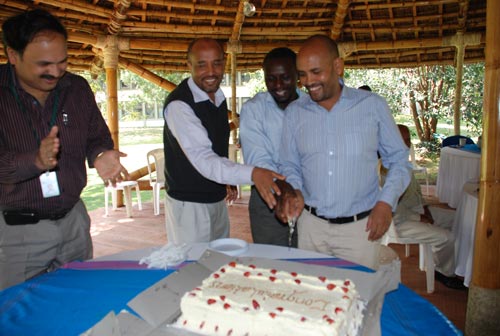On 29 April, CIMMYT had a double reason to celebrate, picking up the award for “Best gender paper” and “Best science paper” (along with Bioversity), at the CGIAR Research Program on Climate Change, Agriculture and Food Security (CCAFS) Science Conference in Copenhagen. The conference was part of a series of CCAFS meetings held from 29 April – 02 May, and was attended by various CIMMYT staff.
The best gender paper, titled ‘Adoption of Agricultural Technologies in Kenya: How Does Gender Matter?’ and co-authored by Simon Wagura Ndiritu, Menale Kassie and Bekele Shiferaw, highlighted the differences between technologies adopted on female- and male-managed farm plots in Kenya. They found that whilst there were gender differences in the adoption of technologies such as the use of animal manure, soil and water conservation, other differences in the use of chemical fertilizers and improved seed may stem from the varying levels of access to resources for men and women, rather than gender itself. “This recognition inspires me to put more effort to produce more quality research that will bring excellent distinction to CIMMYT and myself,” said Kassie, while Ndiritu said “it is an encouragement to a young scientist,” adding that he is looking forward to having the paper published.
The winning science paper, ‘Assessing the vulnerability of traditional maize seed systems in Mexico to climate change’, was authored by David Hodson (FAO), and Mauricio Bellon (Bioversity) and Jonathan Hellin from CIMMYT. With climate change models predicting significant impacts in Mexico and Central America, particularly during the maize growing season (May – October), the paper assessed the capacity of traditional maize seed systems to provide farmers with appropriate genetic material, under the anticipated agro-ecological conditions. Their results indicated that whilst most farmers will have easy access to appropriate seed in the future, those in the highlands will be more vulnerable to climate change and are likely to have to source seed from outside their traditional supplies, entailing significant additional costs and changes to the traditional supply chain.
 To share the good news, the Socioeconomics program hosted a get-together with the team in Nairobi, Kenya. During the cake cutting ceremony, the best gender paper award was dedicated to women farmers from Embu and Kakamega in Kenya’s Eastern and Western Provinces, where the data was collected. The Nairobi team also took the opportunity to initiate monthly seminars in order to share research findings hosted by the Global Maize Program and the Socioeconomics program and promote regular interaction among the team. The program directors, Bekele Shiferaw and B. M. Prasanna nominated Dan Makumbi, Hugo De Groote, Sika Gbegbelegbe, Fred Kanampiu, and Sarah Kibera, to form the organizing committee for the seminars.
To share the good news, the Socioeconomics program hosted a get-together with the team in Nairobi, Kenya. During the cake cutting ceremony, the best gender paper award was dedicated to women farmers from Embu and Kakamega in Kenya’s Eastern and Western Provinces, where the data was collected. The Nairobi team also took the opportunity to initiate monthly seminars in order to share research findings hosted by the Global Maize Program and the Socioeconomics program and promote regular interaction among the team. The program directors, Bekele Shiferaw and B. M. Prasanna nominated Dan Makumbi, Hugo De Groote, Sika Gbegbelegbe, Fred Kanampiu, and Sarah Kibera, to form the organizing committee for the seminars.
 Climate adaptation and mitigation
Climate adaptation and mitigation 
